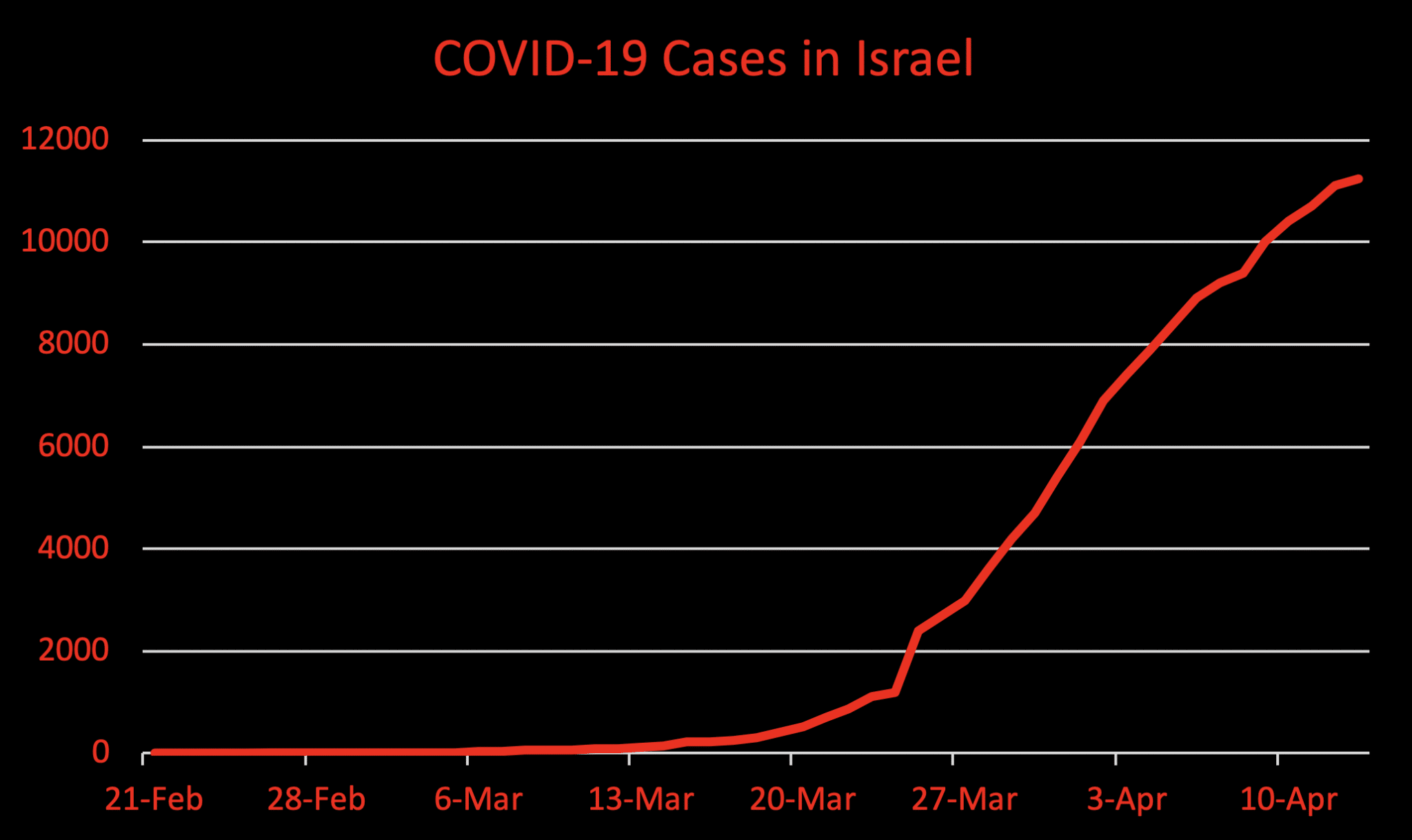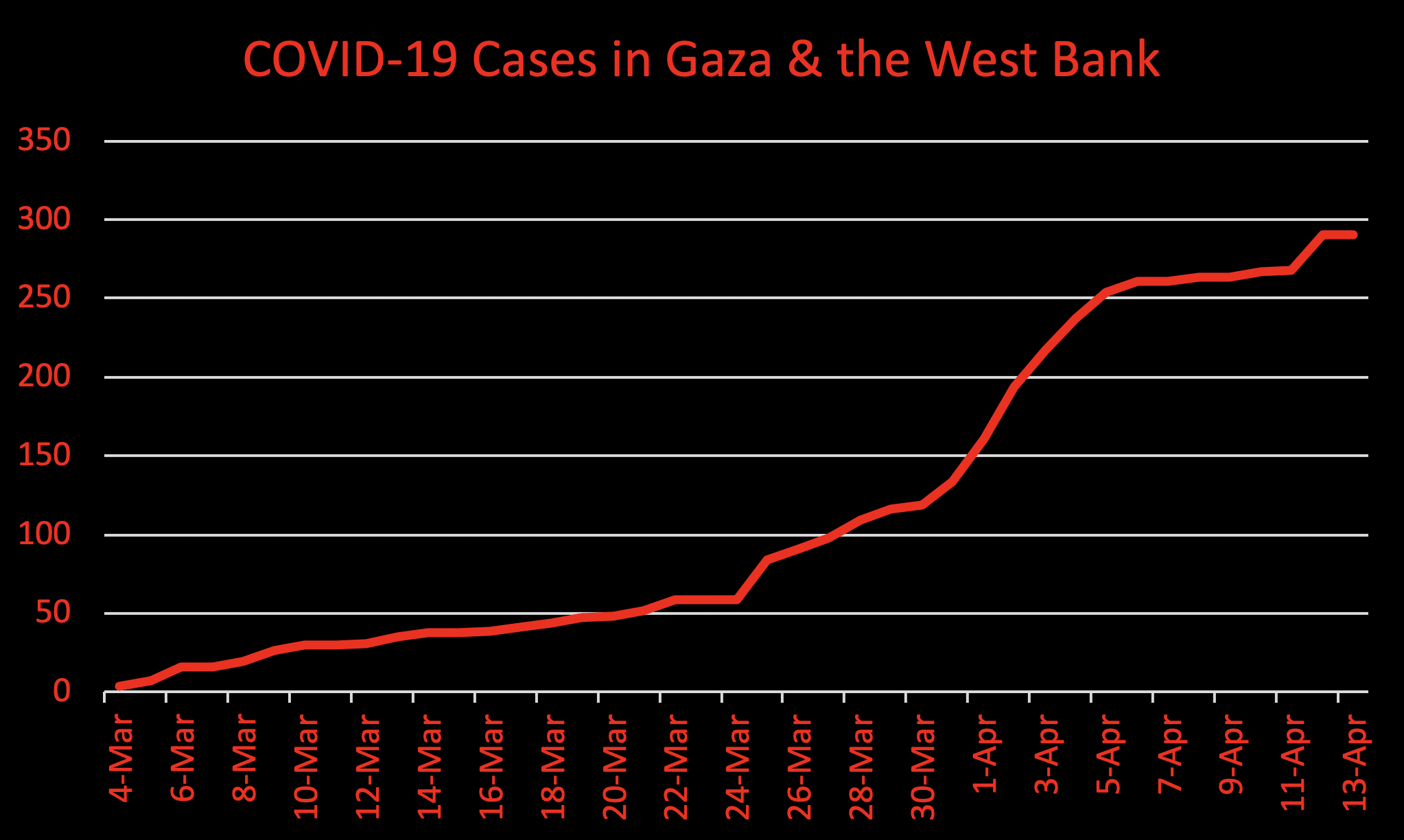April 13, 2020 | Policy Brief
COVID-19 in Israel and the Palestinian Territories
April 13, 2020 | Policy Brief
COVID-19 in Israel and the Palestinian Territories
Israel’s COVID-19 outbreak has profoundly impacted the country’s domestic political and economic situation. Israel’s relationship with the Palestinian Authority (PA) is better than expected, but a brewing public health catastrophe in Gaza threatens to destabilize the enclave and upend an uneasy calm between Israel and Hamas.
Situation Overview
As of April 13, Israel has reported over 11,235 confirmed cases and 113 deaths. The ultraorthodox city of Bnei Brak, with a population of 200,000, has been hit particularly hard, leading Israel to impose a city-wide lockdown.
The West Bank and Gaza, meanwhile, have reported a total of 290 cases and two deaths. So far, just 13 of those cases have been in Gaza, originating with two Palestinians returning from Pakistan. To prevent the spread of the virus, the Hamas-led government has established quarantine facilities for Palestinians returning to Gaza. However, the lack of competent public health facilities, not to mention the opacity of the government in Gaza, raises questions about the veracity of these numbers.
Israel has coordinated the delivery of testing kits, disinfectant material, masks, ventilators, and medicine to the West Bank and Gaza throughout the crisis. Israel has also allowed PA police to enter an Arab part of East Jerusalem, normally off limits to the PA. This assistance led the United Nations, typically critical of the Jewish state, to praise the “close, unprecedented” Israeli-Palestinian cooperation on COVID-19.
COVID-19 in the Greater Middle East
| Country | Cases | Deaths |
| Iran | 73,303 | 4,585 |
| Turkey | 56,956 | 1,198 |
| Israel | 11,235 | 113 |
| Pakistan | 5,493 | 93 |
| Saudi Arabia | 4,934 | 65 |
| UAE | 4,123 | 25 |
| Qatar | 3,231 | 7 |
| Egypt | 2,065 | 159 |
| Algeria | 1,914 | 293 |
| Morocco | 1,746 | 120 |
| Iraq | 1,378 | 78 |
| Bahrain | 1,348 | 6 |
| Kuwait | 1,300 | 2 |
| Oman | 727 | 4 |
| Tunisia | 707 | 31 |
| Afghanistan | 665 | 21 |
| Lebanon | 632 | 20 |
| Jordan | 389 | 7 |
| W. Bank & Gaza | 290 | 2 |
| Libya | 25 | 1 |
| Syria | 25 | 2 |
| Somalia | 25 | 2 |
| Sudan | 19 | 2 |
| Yemen | 1 | 0 |
Source: JHU Coronavirus Resource Center
Data current as of 12:30 PM, April 13, 2020.
Implications
The economic lockdown in Israel has caused unemployment to spike to 25 percent and will likely cause a more than 5 percent contraction in the country’s GDP. While Israel’s economic challenges mount, there may be some good news for Israelis on the political front. In an effort to combat the crisis and avoid triggering Israel’s fourth election in one year, Prime Minister Benjamin Netanyahu’s main rival, former Israel Defense Force Chief of Staff Benny Gantz, made the surprising decision late last month to abandon his electoral challenge and form a unity government. While negotiations continue, Netanyahu appears likely to retain the premiership for 18 months before handing the reins to Gantz. Currently, however, negotiations have stalled, with each side blaming the other for the impasse.
For the Palestinians, COVID-19 appears to be somewhat contained. Amidst the crisis, the taboo of cooperating with Israelis has receded in favor of public health. Even so, some Palestinian politicians have incited against Israel. Palestinian Prime Minister Mohammad Shtayyeh, who has led the PA fight against COVID-19, said that the PA is battling “the coronavirus and the occupation virus” and accused Israel of deliberately infecting Palestinians. Shtayyeh, at least for now, has emerged as a top contender to succeed the 84-year-old PA President Mahmoud Abbas, who, like many other aging Palestinian leaders, has remained in isolation throughout the crisis.
In the Gaza Strip, the health crisis has led to a relative decline in violent attacks. Palestinian militants fired a rocket at Israel from Gaza last week, prompting Israeli retaliation. Hamas has also tested some of its projectiles for distance and accuracy, firing them into the Mediterranean Sea. Amidst these provocations, the group is demanding that Israel ease its embargo on the Gaza Strip, which Israel has conditioned on the return of the bodies of two Israeli soldiers held by Hamas since 2014. Hamas leader Yahya Sinwar has not made the negotiations any easier, threatening last week to “end the breathing” of Israel’s more than six million Jewish citizens if additional medical supplies were not delivered to Gaza.
What to Watch for
Were COVID-19 to spread throughout the densely populated Gaza Strip, it would overwhelm Gaza’s dangerously under-resourced medical system and hammer the enclave’s already anemic economy. The ensuing public health catastrophe could undermine Hamas, given the group’s propensity to invest in weaponry over public needs. But a crisis could also place diplomatic pressure on Israel from the international community, which unjustifiably blames Israel for any problems in the enclave. To deflect blame and exploit the crisis, Hamas could escalate attacks against Israel, sparking needless conflict at a dangerous moment in the Middle East.
David May is a research analyst at the Foundation for Defense of Democracies (FDD), where he contributes to FDD’s Center on Military and Political Power (CMPP). For more analysis from David and CMPP, please subscribe HERE. Follow David on Twitter @DavidSamuelMay. Follow FDD on Twitter @FDD and @FDD_CMPP. FDD is a Washington, DC-based, nonpartisan research institute focusing on national security and foreign policy.

